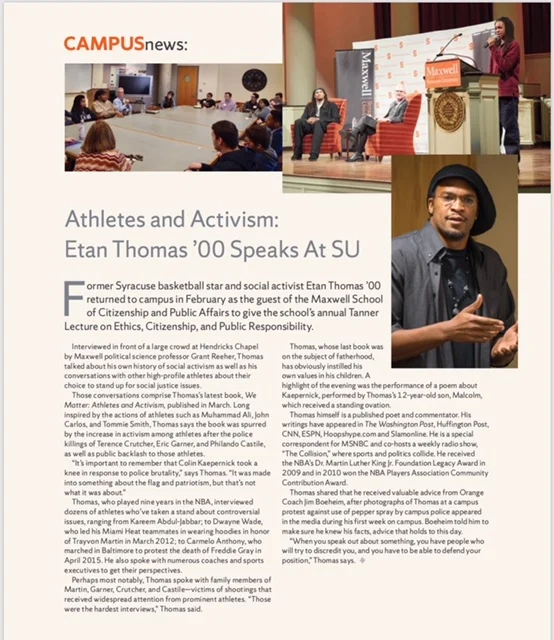Syracuse, N.Y. -- Former Syracuse basketball star and social justice advocate Etan Thomas spoke in Syracuse's Hendricks Chapel on Monday night as part of the Maxwell School's Tanner Lecture Series on Ethics, Citizenship and Public Responsibility.
Thomas was discussing his his new book "We Matter: Athletes and Activism," a work spurred by the increase in athletes publicly addressing social justice issues following the police killings of Terence Crutcher, Eric Garner and Philando Castille, along with the country's loud reaction to those athletes.
Thomas said the current activism of athletes like Colin Kaepernick reminds him of his heros from the 1960s, when athletes like Muhammad Ali, John Carlos, Kareem Abdul-Jabbar and Bill Russell were vilified for sharing opinions. It's a reality shared by today's athletes, with criticism coming from a variety of critics, including President Donald Trump.
Thomas' book includes interviews with many of the former athletes, along with modern figures who have become known for activism like Carmelo Anthony, Michael Bennett and Steve Kerr.
Thomas was introduced for his lecture by Syracuse men's basketball coach coach Jim Boeheim, and he shared the spotlight with his 12-year-old son Malcolm, who recited a poem about Kaepernick.
Thomas spoke in length on a number of subjects for more than an hour. Here are some of the more notable thoughts and anecdotes.
On the different realities in America when dealing with police officers: "This is something that I've really had to come to grips with. There is a different reality that a lot of mainstream America can not relate to. It's almost having to remove yourself from the comfort of being yourself and trying to see the world through someone else's view. But it's not your reality.
"So we talk about the police and the differences between when you are stopped by the police and when I am stopped by the police. There are huge differences. As an example my son Malcolm and I were coming from an AAU practice with one of his teammates and we were stopped by the police. I had a tail light that was out. I'm stopped by the police so I turn the music down, roll all the windows down, turn the interior light on, put my phone on record, my wallet on the dashboard, my hands at 10 and 2. Malcolm is looking at me doing all this stuff like, 'What are you doing?'
"I have to think that I have to create a non-threatening environment. That has to be my first thought because it is a matter of life and death. My only concern at that point is to get home safely, and get Malcolm and his teammate home safely. That is not a reality mainstream America can relate to because that's not what you think about when you are stopped by police. That's a hard pill for a lot of people to swallow. That's a hard pill for young people to swallow. Getting home safely is all that matters. There's no point in trying to prove a point that we already know is true, that they are the ones that have the power and they are the ones that are afraid. That's just the reality.
Thomas spoke in length on a number of subjects for more than an hour. Here are some of the more notable thoughts and anecdotes.
On the different realities in America when dealing with police officers: "This is something that I've really had to come to grips with. There is a different reality that a lot of mainstream America can not relate to. It's almost having to remove yourself from the comfort of being yourself and trying to see the world through someone else's view. But it's not your reality.
"So we talk about the police and the differences between when you are stopped by the police and when I am stopped by the police. There are huge differences. As an example my son Malcolm and I were coming from an AAU practice with one of his teammates and we were stopped by the police. I had a tail light that was out. I'm stopped by the police so I turn the music down, roll all the windows down, turn the interior light on, put my phone on record, my wallet on the dashboard, my hands at 10 and 2. Malcolm is looking at me doing all this stuff like, 'What are you doing?'
"I have to think that I have to create a non-threatening environment. That has to be my first thought because it is a matter of life and death. My only concern at that point is to get home safely, and get Malcolm and his teammate home safely. That is not a reality mainstream America can relate to because that's not what you think about when you are stopped by police. That's a hard pill for a lot of people to swallow. That's a hard pill for young people to swallow. Getting home safely is all that matters. There's no point in trying to prove a point that we already know is true, that they are the ones that have the power and they are the ones that are afraid. That's just the reality.
On Syracuse coach Jim Boeheim's role in allowing him to pursue activism: "My first week at Syracuse me and a football player, Roland Williams were on campus, right out there. There was a big rally. They were protesting the campus security being able to use pepper spray. The thought was that if they were using pepper spray the first people they'd use it on was us at the underground parties, the Schine parties. If there's a little altercation, a little argument, they would pepper spray everyone. That was the fear. ....
"We were at the rally, you have everyone in the background and you have me and Roland Williams. That was on the cover of The Daily Orange. That was my first week on campus. Coach, I don't know if he remembers this, but he pulls me into his office and says, 'So you're into a lot of different stuff, huh?' He said, 'That's good. If you use your position and you speak out make sure that you can back it up.' That's all he said. Later on I got what he meant because you have to be able to defend your position. You have to articulate it. People are going to try to discredit you so you have to be able to defend your position. People have asked me if I felt any pushback at Syracuse. I didn't. I felt very supportive coaches.
"I talk about Coach Boeheim and how he used his moment. It was when he had a big number of wins (900) and he used that moment to talk about gun reform. It was after one of the shootings and it's so terrible that there have been so many that I don't remember which one (it was Sandy Hook), but he used that moment to talk about gun reform."
Syracuse coach Jim Boeheim on coaching Thomas: "In coaching you teach and you learn. If you're a good teacher you learn from the people you coach. I learned something from Etan that has really helped me. In a way I knew it but you can not handle every student the same and you can not handle every player the same. What works for one player doesn't always work for another player.
"I found the times I got most vocal with Etan were the times his performance would drop the most. I made a deal with him that I was going to be less vocal. I told him, 'I might be thinking about yelling at you but I'm not going to yell at you.' There were a couple times that I said, 'Etan, Etan, trust me, right now I am screaming inside.' Through it all he was always thoughtful and cared about his teammates. He cared about his coaches. And in general he cared about people. In athletics today it's not all good. There are a lot of things we'd like to change, a lot of things we'd like to be better at. But there are a lot of Etan Thomasas and I was fortunate enough to get this one."
On Donald Trump's impact on athlete activism: "When you have someone like the President of the United States that makes it known that they do not respect your position or your right to speak out, it can do one of two things. It can either silence you or it can empower you. With Trump doing that, especially with the NFL players (where he) directly (made) it known what he wanted them to do and not to do, it united a different fire under them.
"This past season I've seen more activism in the NFL than I can ever remember. It started with Kaepernick taking a knee but since then there have been so many NFL players using their platforms. (Eagles wide receiver) Torrey Smith, after they won the Super Bowl, he didn't just say 'I'm not going to the White House because I don't like Trump.' He broke down what Donald Trump represents, politics aside, of how he conducts himself and how he wouldn't go to any party with someone who has those qualities."
On radio host and Fox news contributor Laura Ingraham telling LeBron James to "shut up and dribble" after an interview in which they discussed social justice issues and politics: "Everyone saw Laura Ingraham and how she criticized LeBron James and Kevin Durant. She said that, basically, they didn't have the right to speak. She attacked their character and intelligence, saying, basically, they didn't have the right to speak about anything other than basketball.
"She told them to shut up and dribble. That's not a new concept, disagreeing with you and telling you to shut up and play. In the book Bill Russell talked a lot about that when he was with the Celtics. .... It's an interesting concept. We should be able to talk about a topic, disagree about it and discuss the topic without attacking each other personally. Where we are in society is that when we disagree with someone we go to a personal attack. You don't talk about the issue anymore. We should be able to, as former President Obama used to say, 'be able to disagree without being disagreeable.'
"Anyone can support someone using their platform when they agree them. That's not hard. When they disagree, that's when shut up and play comes in."






